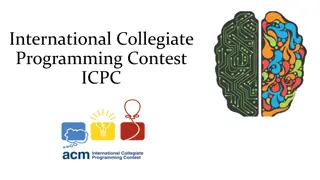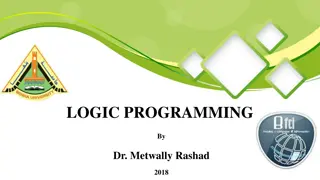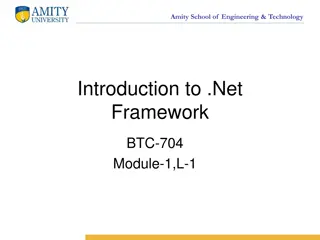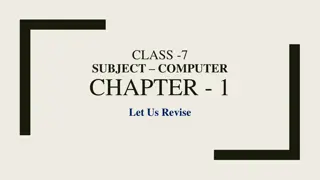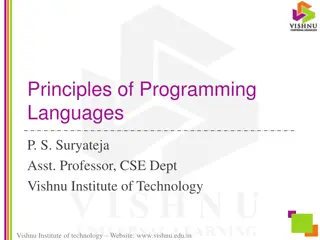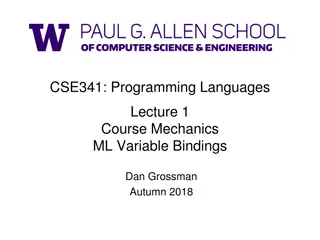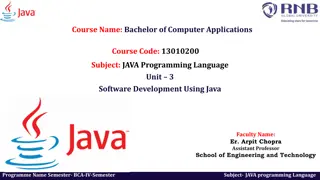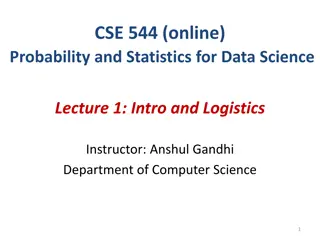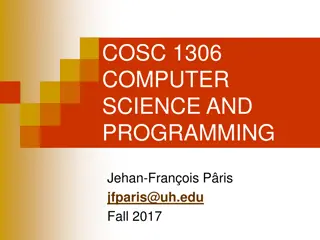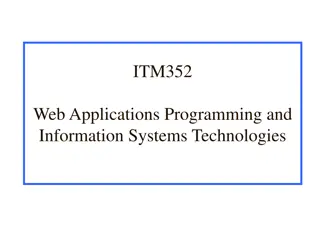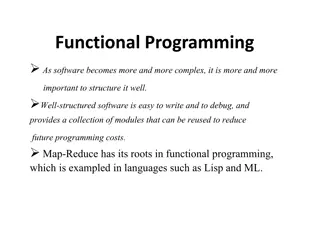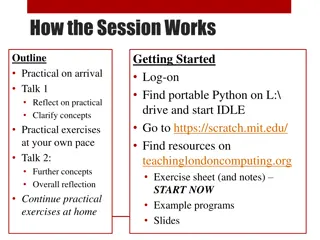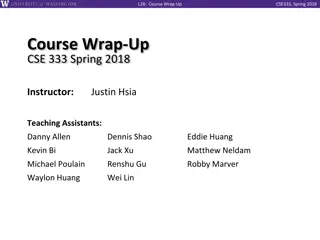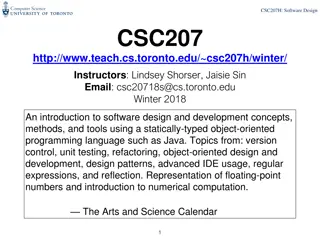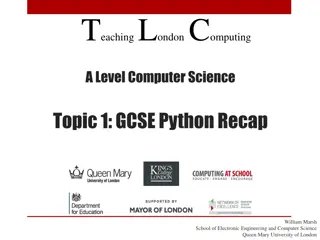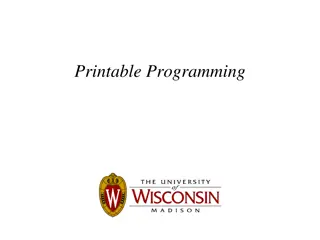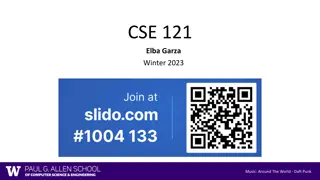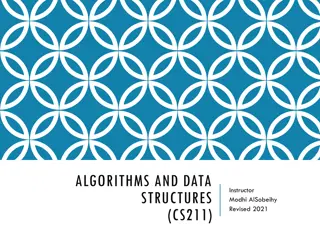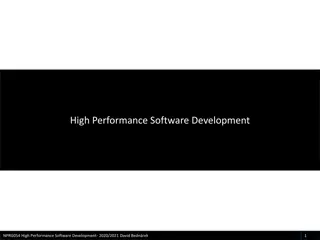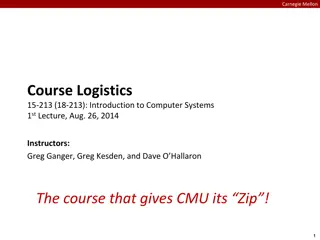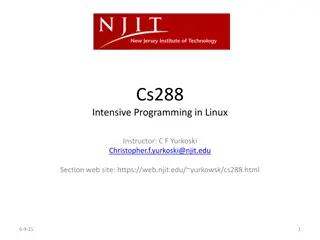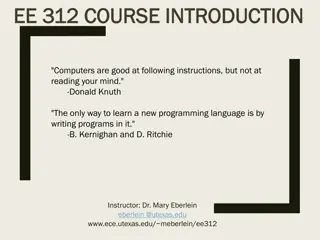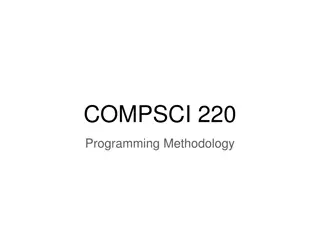Functional Programming
Functional programming, a paradigm that emphasizes declarative programming, pure functions, and limited side effects. Explore the benefits and characteristics of functional programming languages.
0 views • 20 slides
Comprehensive Overview of CSE 123 Course by Nathan Brunelle, Spring 2024
Associate Teaching Professor Nathan Brunelle welcomes students to the CSE 123 course at UW, providing insights into course components, learning objectives, tools and resources, assessment methods, and collaboration opportunities. The course emphasizes computational thinking, code comprehension and w
2 views • 30 slides
Comprehensive C++ Programming Certification Course Overview
Dive into the world of C++ programming with this certification course! Enhance your knowledge of C++ language features, object-oriented programming, problem-solving techniques, and more. Explore topics like arrays, loops, inheritance, polymorphism, and error handling. With 40 hours of content coveri
2 views • 9 slides
Programming in C: Overview and Constants Explanation
Programming in C is a fundamental introductory guide to the C programming language. It covers the basics of C, including its development history, character set, constants, and rules for constructing constants like integer and real constants. Dr. M. A. JAMAL MOHAMED YASEEN ZUBEIR, an Assistant Profes
3 views • 33 slides
International Collegiate Programming Contest (ICPC) Overview and Rules
The International Collegiate Programming Contest (ICPC) is a prestigious global competition in competitive programming supported by major tech companies like Google and Facebook. Participants tackle logical and mathematical problems by developing efficient algorithms and implementing them in various
5 views • 17 slides
Understanding Logic Programming and AI Principles
This course focuses on logic programming principles applied to AI problems. Topics include Prolog programming, backtracking, recursive rule definition, built-in predicates, lists manipulation, and advanced techniques. Declarative languages like Prolog differ from procedural languages by describing p
1 views • 26 slides
Decision Analysis and Operations Research in Management
This content delves into Management Decision Analysis and Operations Research techniques such as Linear Programming, Integer Linear Programming, Dynamic Programming, Nonlinear Programming, and Network Programming. It covers the phases of an Operations Research study, mathematical modeling for decisi
0 views • 36 slides
Introduction to Amity School of Engineering & Technology
Amity School of Engineering & Technology offers courses in .NET Framework, Windows GUI development, C/C++ programming, Visual Basic, and Java/J2EE programming. The curriculum covers topics such as Win32 API, MFC, object-oriented programming, and web development. Students learn to develop application
1 views • 14 slides
Module 2: PSEA and Safe Programming Training of Trainers (ToT) by CRS HRD
This Module 2 focuses on PSEA and Safe Programming, covering key sessions on understanding safe programming, identifying protection and SEA risks, and mitigating risks. It emphasizes the importance of safe programming in increasing safety, dignity, and access, with staff playing a crucial role. Part
2 views • 19 slides
Understanding Computer Programming: Basics and Beyond
In this chapter, we delve into the fundamental concepts of computer programming. We explore the definition of a program, the role of programming languages, types of programming languages, and generations of programming languages. Additionally, an assignment is provided to reinforce the key learnings
0 views • 25 slides
Understanding Object-Oriented Programming (OOP) in Python
Python is a versatile programming language that supports various programming approaches. Object-Oriented Programming (OOP) is a popular method in Python where objects are created to solve programming problems. OOP in Python focuses on creating reusable code, following the principle of DRY (Don't Rep
1 views • 35 slides
Principles of Programming Languages at Vishnu Institute of Technology
Introduction to Principles of Programming Languages course including prerequisites, objectives, outcomes, and syllabus at Vishnu Institute of Technology. The course covers key concepts, popular programming paradigms and languages, practical knowledge in lexical analysis and parsing, as well as writi
0 views • 43 slides
Introduction to Computers and C++ Programming Lecture 1 - Overview and Basics
This lecture covers the fundamental concepts in computer systems and programming using C++. Topics include the main components of a computer, bytes and addresses in memory, computer systems hardware and software, understanding programs, programming languages, compilers, preparing and running C++ pro
1 views • 21 slides
Autumn 2018 CSE341 Programming Languages Course Overview
Welcome to the Autumn 2018 CSE341 course on Programming Languages! Join us for a comprehensive 10-week journey to grasp the core concepts that underlie all programming languages. Dive into ML, Racket, and Ruby while honing your programming skills through homework assignments. Engage with the course
1 views • 32 slides
Web Application Development and Programming CTE Program Overview
Viera High School offers a comprehensive CTE program in Web Application Development and Programming, taught by Mr. Dohmen. Students learn popular programming languages like Python, SQL, JavaScript, Java, C#, and C. The courses cover web programming, JavaScripting, and PHP programming, providing cert
1 views • 7 slides
Introduction to Programming with RobotC in Robotics Education
Programming in robotics involves giving specific directions to a robot using software like RobotC. This introduction covers the basics of programming, software organization, and how to get started with RobotC through creating flow charts and programming tasks. Learn about setting up RobotC, creating
0 views • 8 slides
Introduction to Programming and Computer Instructions
Programming is the process of creating instructions for computers to follow and accomplish tasks. It involves turning human language instructions into detailed binary machine language. Before learning programming, individuals may have different levels of experience, ranging from no experience to pro
0 views • 16 slides
Understanding Java Programming: BCA IV Semester Course Overview
This Bachelor of Computer Applications (BCA) course focuses on Java programming language fundamentals, object-oriented concepts, software development principles, and practical application skills. Students will learn to define Java program features, implement object-oriented features, work with array
0 views • 31 slides
Development of Attosecond Theory for Nobel Prize through Verilog Programming
Attosecond generation is a crucial technique for creating attosecond pulses by manipulating radiation waves. This research paper focuses on developing the Attosecond generation equation through Verilog programming and validating it using test programming techniques. The interface between equations,
0 views • 15 slides
Probability and Statistics for Data Science Course Overview
This online course on Probability and Statistics for Data Science covers essential topics such as Probability theory, Statistical inference, Regression analysis, and more. The course emphasizes the application of statistical techniques in data analysis and provides a solid foundation in Probability
0 views • 37 slides
Introduction to Basic Python Programming Concepts
In this Fall 2017 course, COSC 1306 - Computer Science and Programming by Jehan-François Périr, students delve into the fundamental concepts of Python programming. The course covers values, data types, strings, and identifying malformed strings in Python code.
0 views • 57 slides
CS252 Systems Programming Course Overview
This course overview covers topics such as C programming review, Unix basics, Unix systems programming, and grading details. The course includes labs on C/C++ programming, Unix shell scripting, and writing your own shell. Communication is emphasized through Piazza for questions/answers and Blackboar
0 views • 41 slides
Introduction to Programming Languages and Functional Programming with OCaml
Welcome to Lecture 1 of CSEP505 on Programming Languages focusing on OCaml and functional programming. Professor Dan Grossman introduces the course, discusses the importance of studying programming languages, and shares insights on course mechanics and content. Topics include staff introductions, co
0 views • 84 slides
Understanding ITM352 and Its Role in MIS
Welcome to ITM352, a course focusing on acquiring basic programming skills in a business context. This course emphasizes hands-on experience in developing relevant software applications, addressing real technology problems, and fostering rapid self-learning of IS/IT technologies. Misconceptions arou
0 views • 36 slides
Understanding Functional Programming Paradigm
Functional programming emphasizes well-structured software that is easy to write and debug, with reusable modules to reduce future programming costs. It introduces higher-order functions and first-class function values, fostering declarative programming for tasks like symbolic data manipulation and
0 views • 21 slides
Essential Principles of Teaching Programming Languages
Foundational concepts in programming form the core of computing. This encompasses understanding programming fundamentals, teaching language aspects effectively, statistical programming for data analysis, and guiding students unfamiliar with programming environments towards grasping the logic and sim
0 views • 23 slides
Exploring Computer Programming Principles
Dive into the world of computer programming, covering high-level and machine languages, compilers, interpreters, writing programs, top-down design, and the array of programming languages available. Understand the essentials of building code to control computers, the diversity of programming language
0 views • 23 slides
Transitioning from Scratch to Python: A Practical Approach for Learning Textual Programming
Explore the transition from visual programming in Scratch to textual programming in Python using Turtle Graphics. Engage in practical exercises, clarify key concepts, and reflect on the challenges and progress in learning core programming concepts. Utilize resources from TeachingLondon Computing to
0 views • 21 slides
Course Wrap-Up: CSE333 Spring 2018 Overview
This is a wrap-up of the CSE333 course for Spring 2018, covering administrative details, course goals, systems programming, main topics, and a 100,000-foot view of the course map. The course emphasizes building system programming skills in C/C++, understanding low-level concepts, memory management,
0 views • 21 slides
CSC207H Software Design Course Overview
Winter 2018's CSC207H Software Design course focuses on software design and development concepts, methods, and tools using Java. The course covers topics like version control, unit testing, refactoring, object-oriented design, design patterns, and more. Students are expected to spend 8-10 hours per
0 views • 30 slides
Introduction to Programming Concepts in A-Level Computer Science
This material covers a recap of GCSE Python programming concepts and outlines the course contents for A-level curricula at William Marsh School of Electronic Engineering and Computer Science, Queen Mary University of London. It explores the essence of programming, problem-solving techniques, computa
0 views • 33 slides
Interactive 3D Printing and Programming Course
Deep dive into the world of 3D design and programming with an interactive course that covers visual thinking, programming basics, project presentations, and CADjs. No prior programming experience required. Learn to create 3D models, manipulate shapes, and understand the process from design to 3D pri
0 views • 13 slides
Winter 2023 Programming Course Announcements and Reminders
Dive into the Winter 2023 programming course with insights on missed quizzes, resubmission opportunities, upcoming assignments, nested loops syntax, random methods, and the significance of defining methods in programming tasks.
0 views • 4 slides
Comprehensive Guide to Algorithms and Data Structures Course (CS211)
Explore the world of algorithms and data structures with the CS211 course instructed by Modhi AlSobeihy. Enhance problem-solving skills, implement algorithms, select appropriate data structures, and apply object-oriented concepts in application design. The course covers a range of topics from theory
0 views • 11 slides
High Performance Software Development - Topics and Related Lectures
This course on High Performance Software Development covers various topics such as modern programming styles, CPU properties, performance tuning, compiler optimization, memory hierarchy, and more. It also emphasizes the importance of using vector instructions within C/C++ for parallel programming. T
0 views • 10 slides
Carnegie Mellon Course Logistics: Introduction to Computer Systems
Carnegie Mellon University offers the course 15-213: Introduction to Computer Systems, taught by instructors Greg Ganger, Greg Kesden, and Dave O. Hallaron. The course covers essential topics in computer systems and programming, emphasizing practical skills through lectures, labs, and exams. Recomme
0 views • 23 slides
CS288 Intensive Programming in Linux - Course Updates and Homework Review
In CS288 Intensive Programming in Linux, Professor C.F. Yurkoski shared announcements regarding TA contact info, a sneak peek at upcoming quizzes, and file editing tips. The course also covered evaluation quiz results and practical exercises using tools like vi and tr. Homework assignments focused o
0 views • 35 slides
CS 288-102 Intensive Programming in Linux Spring 2017 Course Details
Learn Linux programming, C language proficiency, Bash scripting, and more in this intensive course taught by Instructor C.F. Yurkoski. The course covers programming in Linux environment, command line interface, C language, client/server programming, and essential programming concepts like pointers,
0 views • 31 slides
Introduction to EE 312 Course and Computer Programming
Explore the introductory content for the EE 312 course featuring quotes by Donald Knuth and B. Kernighan. Get to know the instructor, Dr. Mary Eberlein, and the course objectives. Discover the teaching team, communication methods, and tips for success in the course. Dive into programming basics and
0 views • 16 slides
Functional Programming Concepts for COMPSCI 220 Programming Methodology
In this tutorial, we explore functional programming concepts in the context of COMPSCI 220 Programming Methodology. We delve into writing functions using `reduce` and discuss examples and implementations of various functions like sum, product, and string length calculation. We also analyze the diffe
1 views • 47 slides




